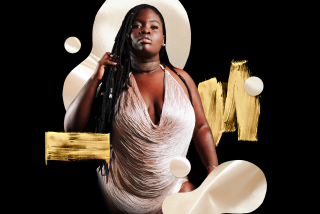Moment of Friday: An Angolan dance jam from artist Okwui Okpokwasili
A young girl stands in a corner, half dancing, half wriggling. The movements are adult as much as they are childlike. She shakes her hips with a budding sense of sensuality, then flails her arms as if she were having a temper tantrum.
This sequence is the opening scene from New York artist Okwui Okpokwasili’s gripping one-woman show, “Bronx Gothic,” which is having its West Coast premiere under the auspices of Show Box L.A. (Seriously, go see it. It’s riveting.)
The hybrid play/performance tells the story of two tweenage girls through the intensely emotional and unwittingly hilarious notes they pass to each other in class.
“I was inspired by notes because we’d pass them around and they’d get into the wrong hands and they’d create these seismic social eruptions,” says Okpokwasili, who grew up in the Parkchester neighborhood of the Bronx. “We were having this really full world and the language was so dense and thick and filled with curses and love — all of it happening under the noses of our teachers.”
In between the spoken bits, Okpokwasili breaks into sequences that are all about movement: shaking hips, writhing on the floor, looking as if she is going to pick a fight with the air. It isn’t dance per se, but it could be.
“I make movement,” says Okpokwasili, who despite her slender dancer’s frame studied theater instead. “I think about the psychic condition of a person in a context and what they might do with their body, and that’s where the movement comes from.”
It is this interest — in the movements that might reflect the character of an individual — that inspired Okpokwasili to the song “Mwangolé” by Djeff Afrozila for Moment of Friday. Afrozila is a Portuguese-born DJ who is the son of Angolan and Cape Verdean parents, and who deejays in Europe and Africa. This video, which was shot in Angola, features local performers Nacobeta, Agre G and Game Walla.
Okpokwasili discovered Afrozila’s music after her mentor, dancer and choreographer Ralph Lemon, sent her the video link. She says she took to it immediately.
“First, I just love the name,” says Okpokwasili, who has African roots herself. (She is the daughter of Nigerian parents.) “Afrozila to me almost suggests this huge and beautiful thing that comes in and kind of eats you and takes you in and spits you out. It reverses the idea of people going into Africa and leaving with all the good stuff. This is a case of Africa taking what it needs.”
But what really drew her to the video is the dancing.
“There’s a virtuosity to it, a deep intelligence,” she explains. “And you don’t need to go into a theater to see it. The performance is in the street and in front of your car. The performance is everywhere.”
It also offers a marked contrast to many American music videos, in which dancers move in almost military formation.
“A lot of Western music videos are so anodyne and sterilized,” she says. “It’s kind of a cold virtuosity. You don’t see the individual. You just see the choreography. But in this video, you see each person and they are each conveying intelligent information.”
Certainly, there is an unbridled joy to watching the dancers in “Mwangolé,” who are young and old, skinny and chubby, casual and well-dressed. (The infectious electronica/African beats don’t hurt either.)
When Okpokwasili sent me the link, I found myself in a YouTube timesuck, watching “Mwangolé” (repeatedly) along with a string of other Afrozila tunes. (I really dig “Elegom Bounsa,” which comes with a thumping house beat.)
So set aside at least half an hour. It’s impossible to watch just one. It’s also impossible not to shake some rump.
“Bronx Gothic” is on view through Saturday at the Highland Park Ebell Club, 131 S. Avenue 57, Highland Park, showboxla.org.
Find me on the Twitters @cmonstah.
More to Read
The biggest entertainment stories
Get our big stories about Hollywood, film, television, music, arts, culture and more right in your inbox as soon as they publish.
You may occasionally receive promotional content from the Los Angeles Times.











